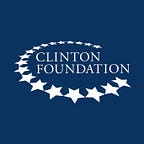20 Years of Data, 1 Year Later: Where are we on gender equality?
This post originally appeared on Mogul.
There has never been a better time in human history to be born female. And yet, today, we know that girls and women make up the majority of the world’s undereducated and uneducated and remain the world’s biggest source of untapped potential. In 2016, it’s still true that in no country on earth are women given equal rights and equal opportunities — to education, to health care, to equal pay for equal work — to men.
This time last year, on International Women’s Day, informed by the data on the Clinton Foundation’s NoCeilings.org and released in the Full Participation Report, in partnership with the Gates Foundation, a group of women and men from across the world came together to tell the world that we are “not there” on issues of gender equality. We saw women symbolically disappear from videos, radio, social media, magazine covers, and some of the biggest billboards in Times Square.
If you weren’t with us last year, let’s review. No Ceilings compiled more than 850,000 data points to reveal good news and not-so-good news about the gains women had made over the past two decades, and the staggering gaps that still remain. For example, we know from the data that today, girls and boys are entering primary school at equal rates, maternal mortality has nearly halved, and more constitutions than ever are protecting women’s rights.
But we also know that gender gaps persist. We see it when we look at enrollment and completion rates for middle and high school; in reports showing that over 800 women a day still die due to pregnancy or childbirth-related complications; in the fact that gender-based violence remains a global epidemic; and from the reality that women’s labor force participation has stagnated over 20 years. We also know we’ve lost ground in some areas; for example, women in the U.S. earn a smaller share of computer science degrees today than they did in the 1980s, and the maternal mortality rate in the United States has actually gone up since 1995. Globally, progress in the areas of health and child marriage have been uneven, particularly among poor, rural and marginalized girls and women. We can and must do more to change this.
Over the course of the last year, we’ve also seen incredible progress and continued momentum in the effort to advance gender equality worldwide. From the incomparable Malala Yousafzai who opened a school for young Syrian refugee girls to women now holding coaching positions in the NFL and NBA, we are making progress. For the first time, through the “State of the World’s Fathers” report, we have a clear data-driven snapshot of the critical role men play in parenting and caregiving; and for the first time in history, Saudi women can now vote and run for office. In the newly globally adopted UN Sustainable Development Goals, a set of 17 ambitious and essential goals to address our most pressing global challenges and build a better future, there is a clear recognition of the role that gender equity plays in achieving goals as diverse as combating climate change and defeating poverty. Equally as inspiring are the incredible advocates and ceiling breakers who are speaking out, achieving at new heights, and working to improve not only their lives, but the lives of everyone around them.
This idea drives so much of our own work at the Clinton Foundation, and especially our annual Clinton Global Initiative University (CGI U) meeting, which will kick off next month. Each year at CGI U, emerging young leaders from around the world gather together to discuss the challenges facing their communities and develop commitments-to-action to address those challenges. Every year, we see remarkable CGI U commitments tackling gender inequities here in the U.S. and around the world. For example, Hafsah Lak is a University of Chicago student who is attending this year’s CGI 2016 meeting with a plan to provide desperately needed protection and health care to female survivors of violence in her home country of Pakistan. As part of her commitment, Hafsah will also work to increase the conviction rate against perpetrators of gender-based violence, as well as provide critical resources to empower women and successfully reintegrate women who have suffered gender-based violence into society.
Today, more than ever, we have the roadmap to equality, the data-driven case to support it, and continuing momentum to achieve it. It’s about all of us building toward a more equitable future, together. International Women’s Day shouldn’t be over on March 8th — or forgotten just a week later –so let’s each commit to working together to stay informed and working toward a world in which every girl and woman — no matter where she’s born — has the opportunity to live up to her full potential. Our future depends on it.
